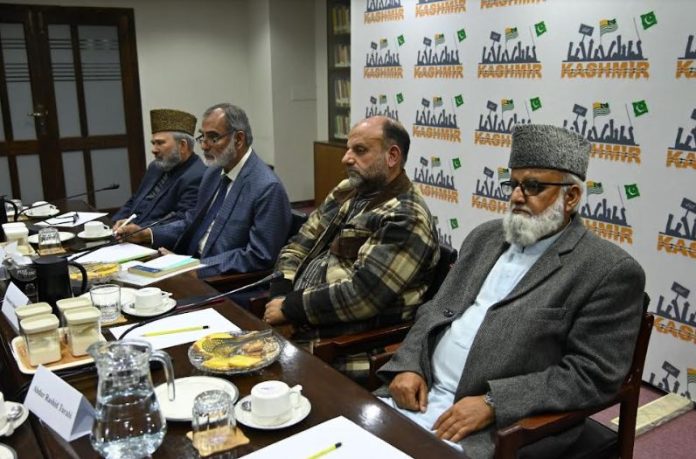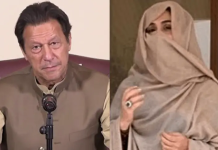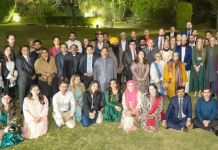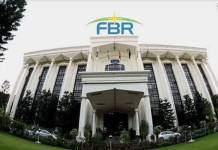ISLAMABAD, MAR 9 /DNA/ – The freedom of Kashmir, its association with Pakistan, and the eminence of Islam are three aspects of one reality, the struggle for which must continue. This was the vision of Dr. Muhammad Ayub Thakur, whose impact on strengthening the Kashmir movement at the global level has been more profound than any individual or group effort.
This was put in words by Prof. Khurshid Ahmad, veteran politician, economist, and patron-in-chief of the Institute of Policy Studies (IPS), who commemorated Dr. Ayub Thakur, Kashmiri political activist and founder of London-based World Kashmir Freedom Movement (WKFM), on his 20th death anniversary today (March 10).
A hybrid seminar, titled ‘Kashmir and Global Conscience: A Discussion in the Light of Dr. Ayub Thakur’s Life and Services,’ was held at IPS, Islamabad, to remember the iconic figure of Kashmir freedom struggle. The seminar was addressed by a distinguished group of scholars and experts, including Khalid Rahman, chairman IPS, Prof. Dr. Fakhr-ul-Islam, advisor research and academic outreach, IPS, Muzzammil Ayyub Thakur, president WKFM and son of late Dr. Ayub Thakur, Victoria Schofield, historian and author, Ghulam Muhammad Safi, convener, Tehreek-e-Hurriyat Jammu and Kashmir, Nasir Qadri Advocate, Director Legal Forum for Kashmir, Abdur Rashid Turabi, leader of Jamaat-e-Islami AJK, Mahmood Ahmad Saghar, convener APHC-AJK chapter, Dr. Ghulam Nabi Fai, secretary general World Kashmir Awareness Forum (WKAF), and Dr. Ghulam Ahmad Mir, president WKAF.
Lauding Ayub Thakur as a visionary thought leader, Prof. Khurshid highlighted that he not only stimulated the Muslim community but also represented Kashmir’s cause globally in political, diplomatic, and academic circles. Dr. Thakur was a PhD in nuclear physics but dedicated his life to the struggle for the oppressed communities around the world, particularly those in the Indian Occupied Jammu and Kashmir. In addition to inspiring hope among the Kashmiri people, his work embodies the spirit of resilience and determination in the fight for independence and justice.
At its core, the Kashmir issue is the issue of Muslim identity, said Muzzammil Thakur, who is continuing his father’s mission. For this, it is important to communicate the movement’s message effectively. Recalling Ayub Thakur’s last televised message, he reiterated the need to invest in nurturing the next generation to carry forward the Kashmir struggle. For that, it is important to refocus and strategize the continuity of the freedom struggle for future generations.
Victoria Schofield emphasized that the strength of the Kashmir movement lies in its recognition and understanding by the international community. She said Thakur was a key contributor to this strength as he globalized the Kashmir freedom movement and brought it to the forefront of the international community’s conscience.
Reflecting on Thakur’s tireless efforts for the mission of Islam, Pakistan, and Kashmir, Ghulam Muhammad Safi noted his influence on global scholars who started presenting the true perspective of Kashmir because of him. However, the current challenges demand a stronger stance, said Nasir Qadri. Drawing parallels with the Palestinian liberation struggle, he urged for a decisive approach and consistency in the efforts of the leadership. Similarly, Mahmood Saghar highlighted the need for assertive and concrete diplomatic efforts beyond mere rhetoric.
Endorsing this view, Rashid Turabi said it is a collective duty to project and protect the efforts and mission of leaders like Thakur. This must be done at all levels with a targeted approach to take the mission to a logical and just conclusion.
The Kashmir movement has been let down by the influential quarters, and there is ever more need to maintain the voice of Kashmir and Palestine, said Ghulam Ahmad Mir. He said the international community must acknowledge that the Kashmiri and Palestinian fight is for their right to self-determination and human rights.
Ghulam Nabi Fai lauded Thakur as a visionary and principled leader, highlighting his instrumental role in founding Kashmir movement organizations internationally. He called for adhering to Thakur’s commitment to mobilizing the diaspora and garnering international support for the Kashmiri freedom movement.
In concluding remarks, Khalid Rahman highlighted the importance of two key factors in shaping the global conscience: street demonstrations and the level of international participation, noting growing support for freedom struggles like Palestine in the UN despite repeated vetoes.
He emphasized the need to understand and leverage these factors to accelerate efforts at the global governance level. He also urged for a reevaluation of Pakistan’s role and called for renewed focus and energy to address the Kashmir issue.

















